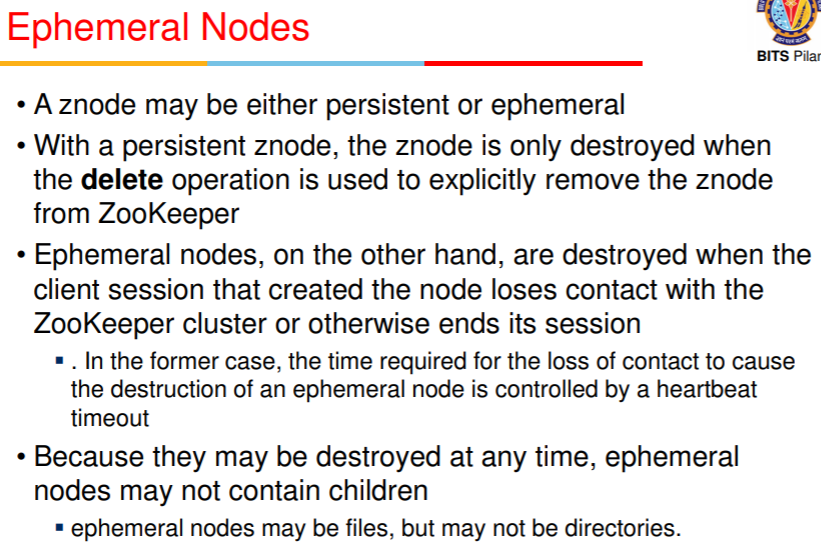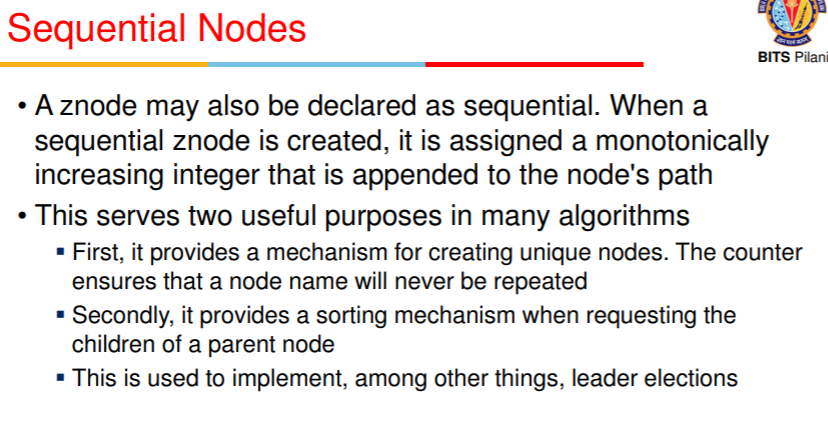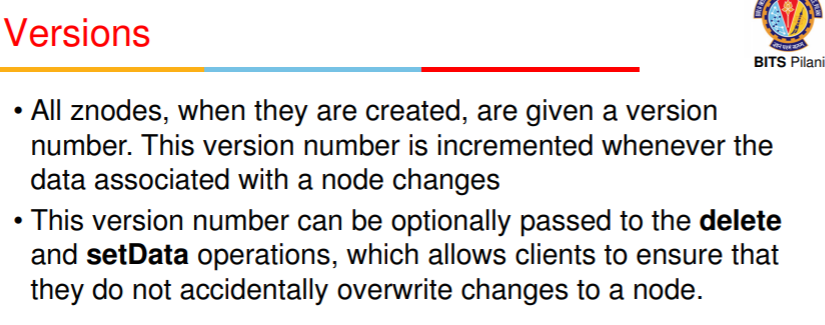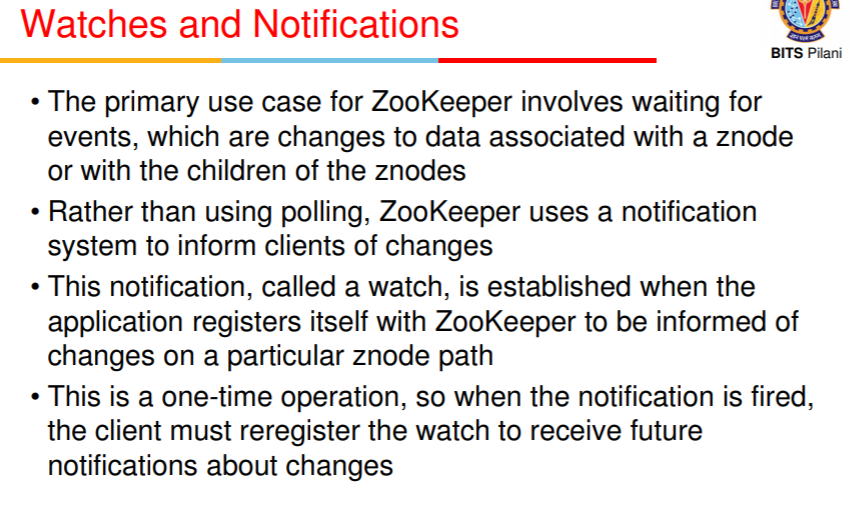Lecture 27
- Lecture 27
- consistency, consensus dekha tha distributed system me. ab cloud systems me.
- cloud bhi distributed hota but diff abstarctions
- we saw 2pc, 3pc, etc
- active, passive replication dekha
- active = every replica can propose and change values = multi-leader replication
- paxos is a active one
- passive = 1 leader at a time. others follow what he says
- active = every replica can propose and change values = multi-leader replication
- zookeeper = coordination as a service, built over ZAB
- coordination reqd for leader election, grtoup membership, service discovery etc
Similarities among paxos protocols
- original paxos was multi-leader/active
- vartiation = multi-paxos
- simplified
- once leader is selected, it continues to handle all req until it goes down.
- zookeeper atomic broadcast (ZAB) based on paxos
- has single leader
- similar to multi-paxos
- atomic broadcast is same as total order broadcast
Raft
- single leader replication
- one leader at a time
- phases involved in zab and raft
- epoch starts with leader election, synchronize with followers and normal opern(broadcasting = whatevr req it gets, f/w to others, if majority yes replies, then commit and tlel others to do so as well)
- epoch lasts until leader fails, and again second epoch starts
- in case of raft, this synchronization phase is not present
- synch phase = ensuring ki whatever leader has is also foll by followers.
- raft me it is done on txn to txn basis so particular synch phase is not reqd
- in zab, leader election is done by who has highest epoch
- epoch is a number, along with epoch #, there is also an index number
- when prev leader fails, leader with highest epoch is elected
- in zab and raft, one leader at a time, until it fails, then next is sleected
- a node can only be elected if it has higher epoch or if epoch is same as highest commited txn id
- i.e. it is aware of latest changes


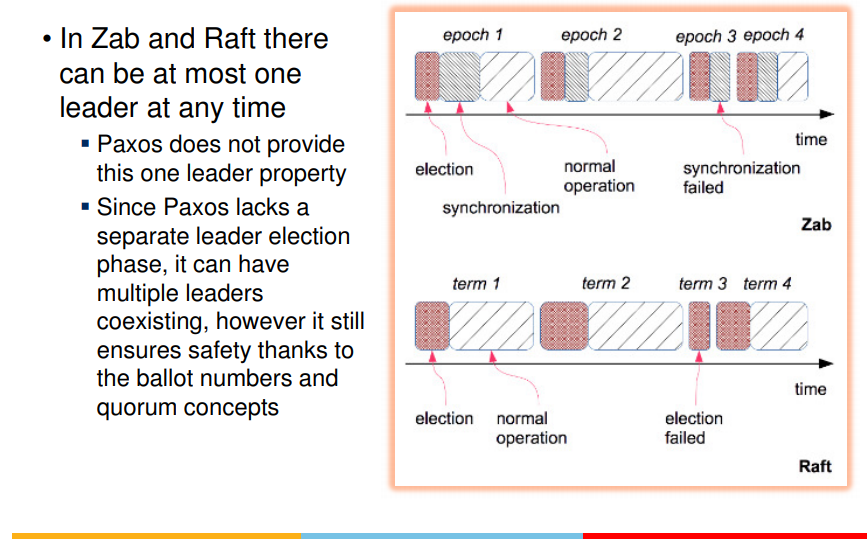

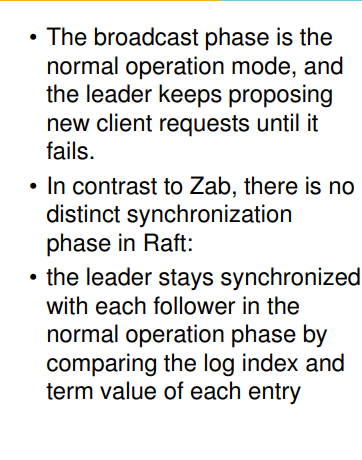
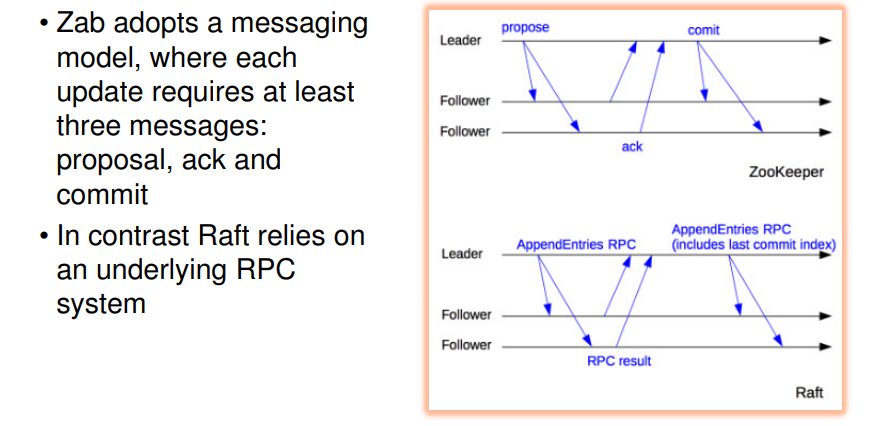
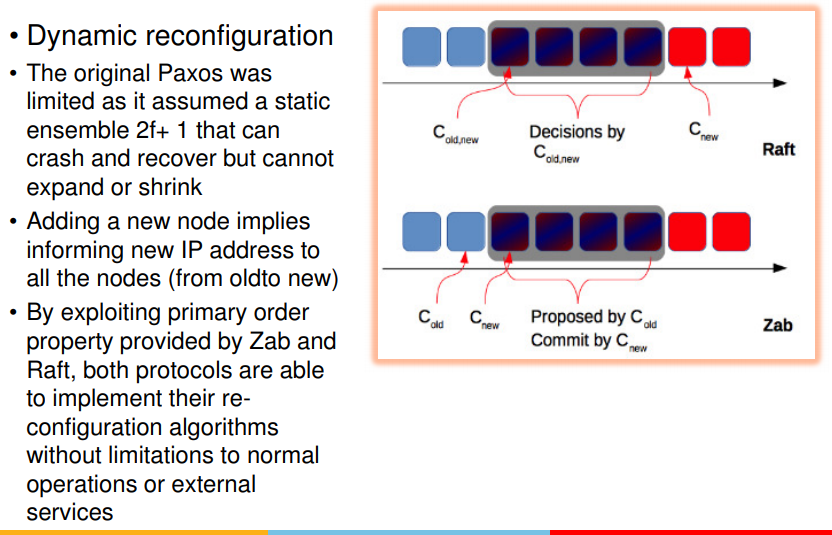
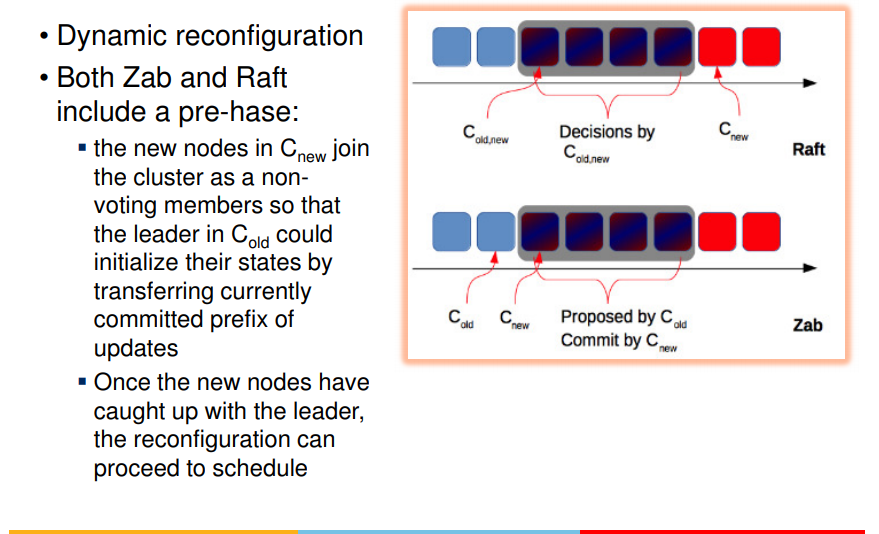
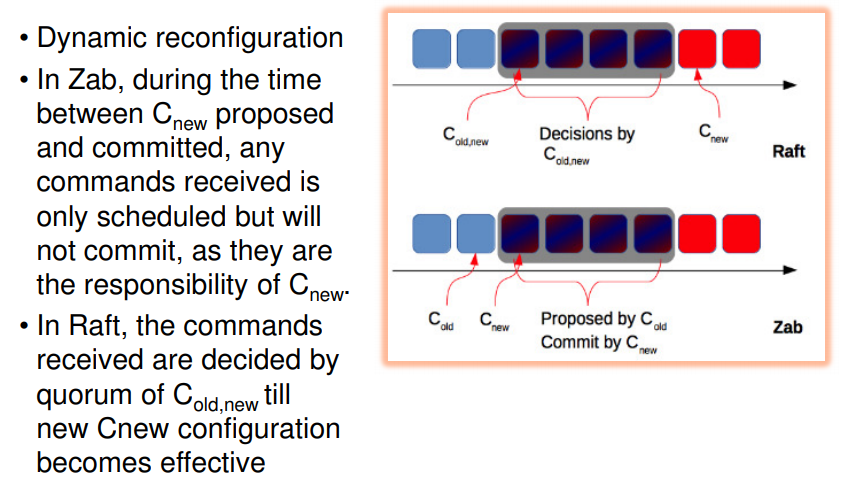
- only half of nodes can crash at a time or #nodes joining can be < majority only.
- this ensures that changes are not lost when nodes go awatyy from system
- this is common property among raft and zab
- that is majority of nodes should not be new, should be part of current configuration
Interface provided by zookeeper, chubby, etcd
- filesystem like api
- hierarchial structure
- directory or file
- ensuring that file is uniquely created at a time is difficult
- maintaining file system in distributed systems is not easy
- ability to set watches
- if there is a change in some file or smth, then a notification is sent to others
- ability to set auto increment key
- distributed systems me tough
- zookeeper deta
- auto-incremented keys
- ensures FIFO order
- adding items to file, should be retrieved in same order
- zookeeper adds key along with data item
- as data item added, key incremented, using key retrieve in fifo order
- observer server - used only for read-only purpose
- not participating in quorum purposes
- read values
- do not write
- helps in achieveing scalibuility


- ephemeral storage
- when node joins, creates a file
- when no more traceable, zookepper or node can remove it
- helkps us in infrastructure config
- counting #nodes
- count # files in directories

- local reads
- u can store and read values from zookeeper
- dynamic config
- u keep adding and removing things
- hidden data feature specific to etcd
- some data is only for particular node and not for others
- client can write items but when listed others cannot access
- weighted replicas
- when they vote, each vote has equal weightage
- here, it means, vote can have weight
- it means vote has some value given to it
- reqd when we don’t have defined #nodes
- single node can be presented as multiple nodes in cluster by increasing its weight
- generally what happens is when i have majority, I need 5/3/7 nodes, and i don’t have odd #nodes, so increase weights of each replica, so that majority gets followed even though we do not have actually majority nodes
- Linearizability is a part of all three
- lineaz is single node abstraction
- any change is visible to all others as well
- partition and repolicas hai though
- zookeeper also provides FIFO order of client requests
- rpelica when receives some req, updates in zookeeper, it provides auto incremented key
Differences
- zookeeper, and chubby are stateful
- rememebr what u have doine
- etcd is stateless
- client has to send in request what it has done
- similar to http and rest api
- one req not related to other req
- zookeeper is not used for frequent operations
- say watch rakhni ek
- notificn from zookeeper, etcd etc
- etcd is stateless
- so client has to do some arrangement, it has to take responsibiliy




Proper use criteria for paxos systems
- consensus is expensive task since multiple msgs reqd to be communicated to replics
- so frequency of writes should be small
- and amount of data in system also should be less
- one thing is to be known initially ki is linearizability is reqd or not, if yes, tabhi inpe jao
- zookeeper is mainly stored to store meta information, like what version of s/w etc
- for routine info, paxos should not be preferred
-
paxos should not be used over WAN, increases latency
- Server Replication
- multiple servers dealing with same data item
- Log Replication
- kafka = publish/subscriber system
- has partition across multiple nodes
- subscriber queries, it should be ddeliber to users
- log replication = duplicate data across multiple nodes
- Synchroniz service
- locking
- until i do this, no body should update it
- serializ is reqd
- use sycnhroniz service or coordination service
- Configuration mgmt
- reqs, which nodes are part of cluster
- leader election
- group membership
- msg queues
- when u write to msg q, buffer me store ho gaye
- nodes process at their own time
- requires coordination
- overwrites na ho
- who is accessing at one time
- msg q may be itslef stored in multiple ndoes for scalability
- barrier orchestration
- wait for everyone to complete a step
- when everyone completes, then move ahead
- can be implemented using watches of zookeeper
- whether to use paxos?
- not for server and log replication
- implement paxos ourselves
- those servers can themselves implement a protocol instead of using any third party or other system for it.
- not for server and log replication
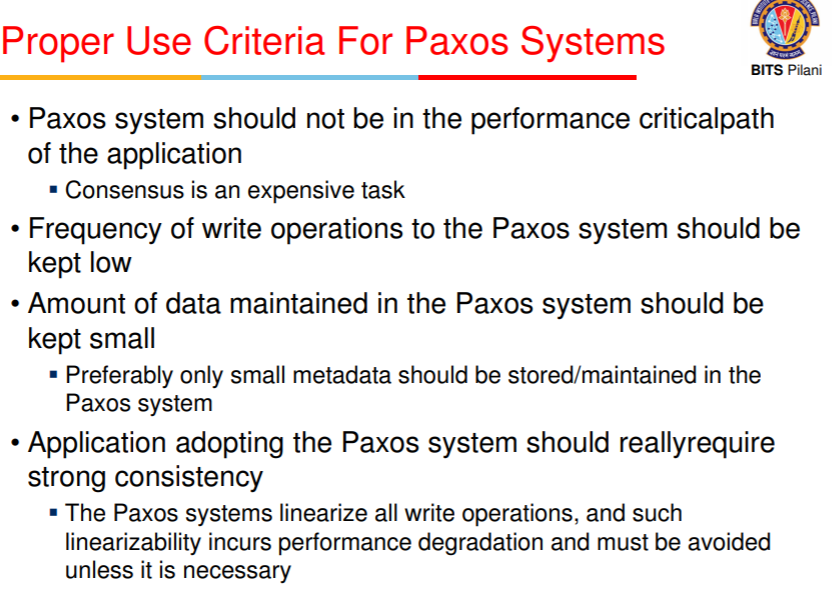

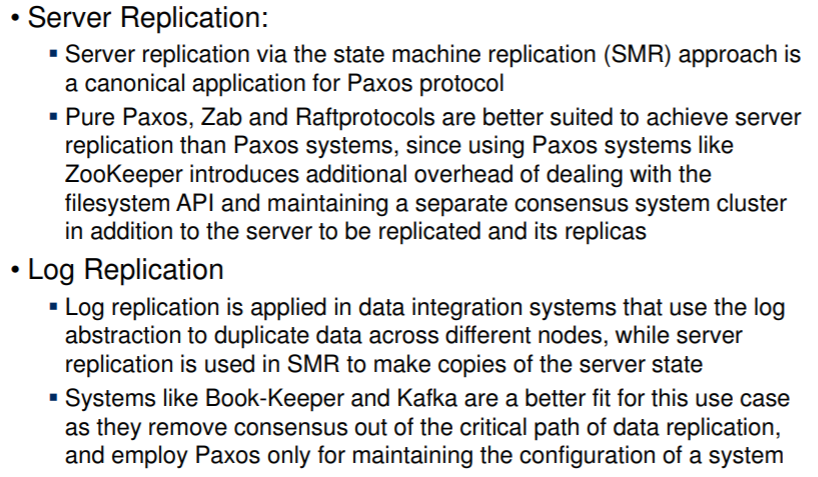
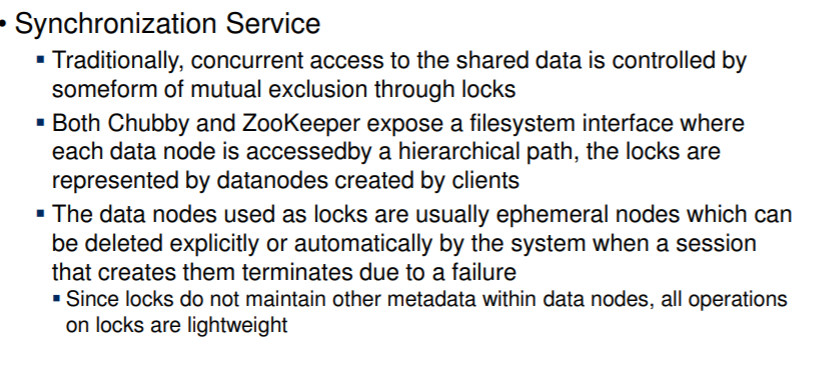
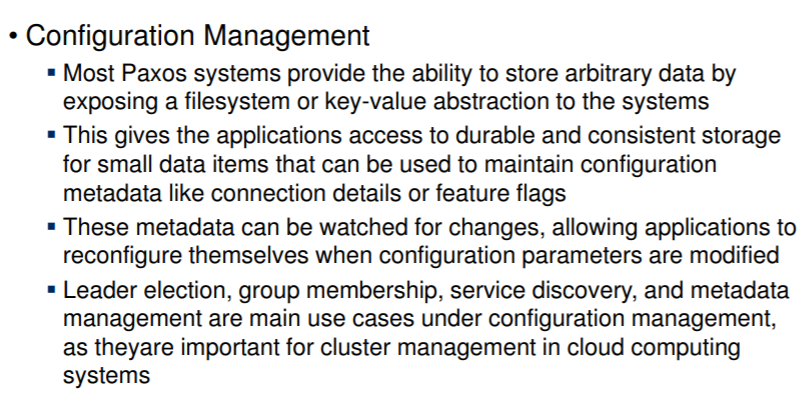
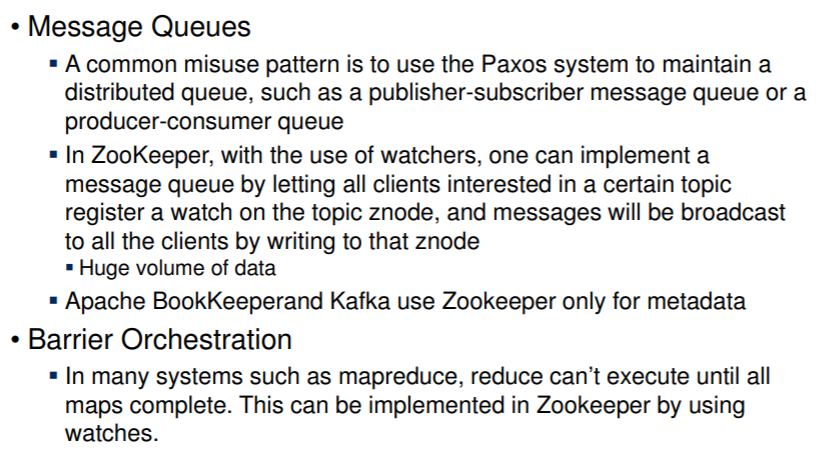
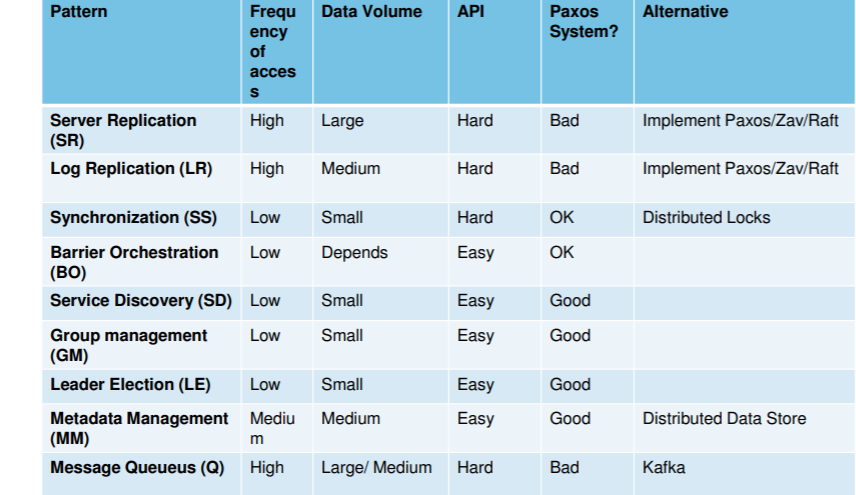
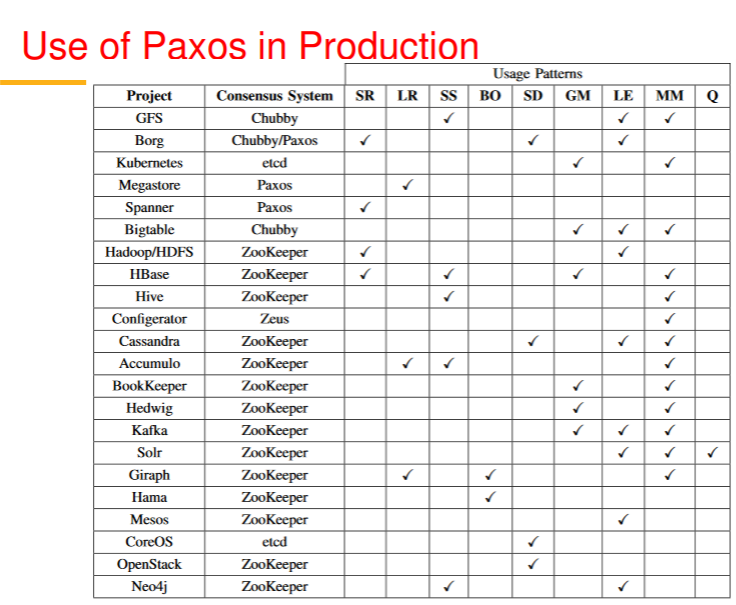
Zookeeper
- highly available, scalable, distributed, configuration, consensus, group memebership, leader election, naming, coord service
- provides strong consistency, ordering
-
fb uses it as controller for sharding
- provides file system like api
- core of zk ds is znode
- nodes arranged hierarchially into tree structures as well as hold data
- max 1mb can store since data nahi store nahi karte, metadata
- no partial writes (when u write, previous is overwritten)
- API
- create
- delete
- setData

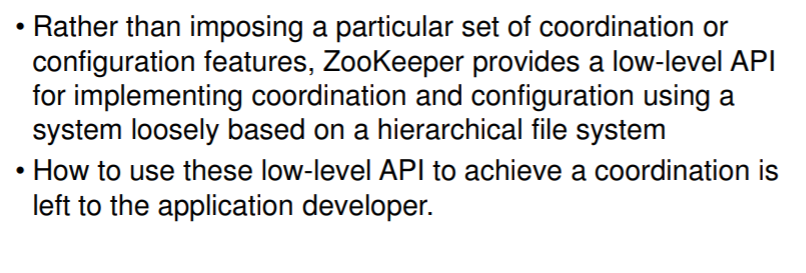
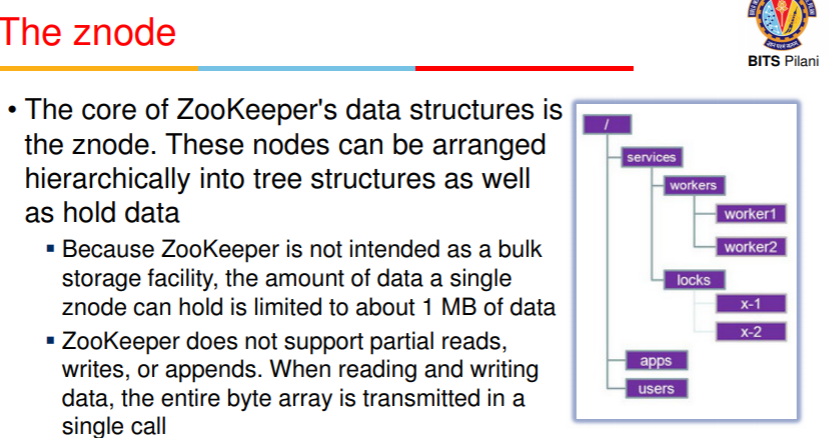
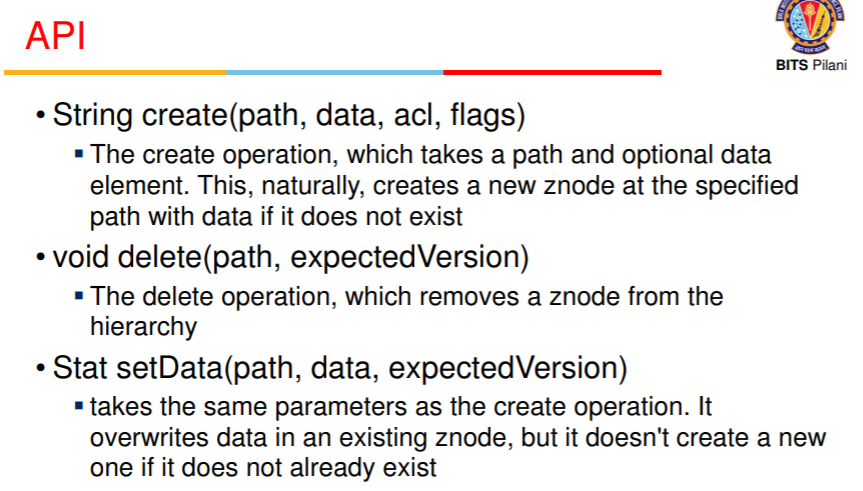
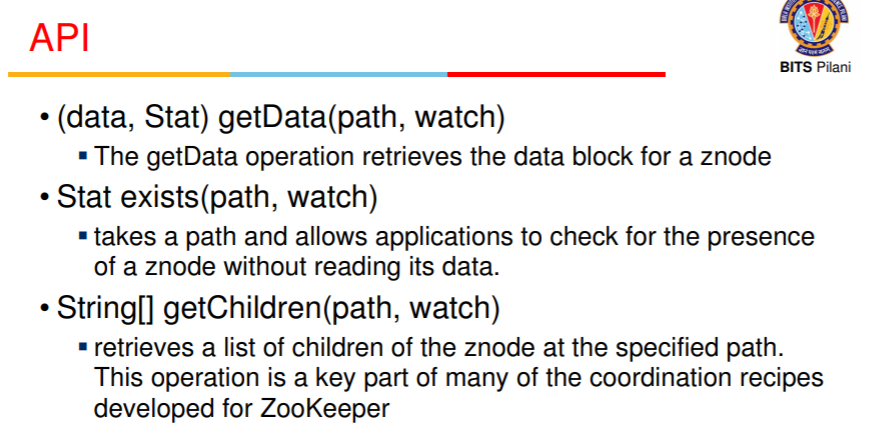
- z node can be persistent or ephemeral
- in ephemeral case, when client session is no more live, ephemeral nodes, deleted from system
- they cannot contain children since can be deleted any node
- znode can also be declared as sequential, i.e. int number de dia ek sabko
-
unique increasing nodes banane agar maanle
- watches
- when data associated with a node or children changes, notification (async) reaches nodes who set watches
- one time operation hai
